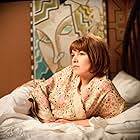IMDb RATING
7.1/10
8.5K
YOUR RATING
Two best friends fall in love with a pair of women, but the relationships soon go in very different directions.Two best friends fall in love with a pair of women, but the relationships soon go in very different directions.Two best friends fall in love with a pair of women, but the relationships soon go in very different directions.
- Won 1 Oscar
- 6 wins & 18 nominations total
Phoebe Nicholls
- Winifred Crich
- (as Sarah Nicholls)
- Director
- Writers
- All cast & crew
- Production, box office & more at IMDbPro
Storyline
Did you know
- TriviaOliver Reed and Sir Alan Bates were initially apprehensive about filming the legendary nude wrestling scene, due to insecurity over who might have the larger 'member'. To 'prepare', both consumed a bottle of vodka each, and subsequently realized there was little difference between the two. Filming continued with relative ease.
- GoofsTowards the end of the movie, in the garden, someone holds up the front page of "The Yorkshire Echo" The headline says Miner's Riots. It should read Miners' Riots.
- Quotes
Gerald Crich: And who is "Gudrun"?
Gudrun Brangwen: In a Norse myth, Gudrun was a sinner who murdered her husband.
Gerald Crich: And will you live up to that?
Gudrun Brangwen: Which would you prefer me to live up to, Mr Crich? The sinner or the murderer?
- ConnectionsFeatured in The Pacemakers: Glenda Jackson (1971)
- SoundtracksI'm Forever Blowing Bubbles
(uncredited)
Written by John W. Kellette (as John William Kellette), James Brockman, Nat Vincent and James Kendis
Featured review
Sometimes lush, sometimes stark, always visually striking.
Ken Russell's film (based on the novel of the same name by D.H. Lawrence) is an interesting piece in that he is able to use his camera to help the audience see one situation from two extremely diverse points-of-view, from that of the loving schoolmarm Ursula (Jennie Linden in a brilliant performance), to the manipulative Gudrun (Glenda Jackson.)
Russell has quite a knack of using his camera to create the emotions he wishes to extract from his audience. Russell's technique of turning his camera sideways as Ursula and Rupert (Alan Bates) run nude through the fields has been dismissed by some, but it is quite effective in creating the unreal state in which their romance seems to find them, one quite different from the hardness and madness that surrounds them. This too is achieved to stunning effect as the two lovers are seen twisted together in the mud in the same position that two deceased lovers had been found only hours before. The colors surrounding these two are always bright and warm, in stark contrast to the way the other pair of lovers, Gudrun and Gerald (Oliver Reed) are photographed.
Gudrun and Gerald's initial sexual encounter is harshly lit and edited, emphasizing the brutality of their situation. Their love is shown to be more of an addiction, rather than true love.
It would take more than 1,000 words to paint an accurate work picture of the films' creative genius and incredible cinematography. One scene in particular, a nude wrestling match between Rupert and Gerald quite defies description, and I urge you to see the film and experience it's mastery yourself.
Russell has quite a knack of using his camera to create the emotions he wishes to extract from his audience. Russell's technique of turning his camera sideways as Ursula and Rupert (Alan Bates) run nude through the fields has been dismissed by some, but it is quite effective in creating the unreal state in which their romance seems to find them, one quite different from the hardness and madness that surrounds them. This too is achieved to stunning effect as the two lovers are seen twisted together in the mud in the same position that two deceased lovers had been found only hours before. The colors surrounding these two are always bright and warm, in stark contrast to the way the other pair of lovers, Gudrun and Gerald (Oliver Reed) are photographed.
Gudrun and Gerald's initial sexual encounter is harshly lit and edited, emphasizing the brutality of their situation. Their love is shown to be more of an addiction, rather than true love.
It would take more than 1,000 words to paint an accurate work picture of the films' creative genius and incredible cinematography. One scene in particular, a nude wrestling match between Rupert and Gerald quite defies description, and I urge you to see the film and experience it's mastery yourself.
helpful•573
- JohnnyOldSoul
- Sep 13, 1998
- How long is Women in Love?Powered by Alexa
Details
- Release date
- Country of origin
- Languages
- Also known as
- Liebende Frauen
- Filming locations
- Elvaston Castle Country Park, Derby, Derbyshire, England, UK(Crich estate, party by the lake)
- Production company
- See more company credits at IMDbPro
Box office
- Budget
- $1,600,000 (estimated)
- Gross worldwide
- $2,098
Contribute to this page
Suggest an edit or add missing content













































